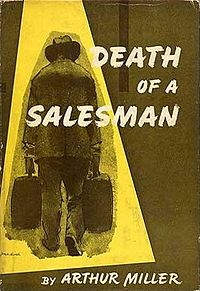Introduction
Read the play in pdf here.
Below are possible essay topics for Death of a Salesman. Bear these in mind as you read the play as we will inevitably come back to them once we have finished.
Death of a Salesman Essay Topics
We will also discuss possible Written Task topics, which we will also come back to during the course of reading the play.
Here is some basic background information about the playwright, the period when the play was first written and performed, and how it was received.
Death of a Salesman Background Information
Too old? How could a play written and performed over 60 years ago possibly be relevant to the modern world? Both articles below contain important thoughts about Miller’s themes, written this year about current events.
Watch and read the link below, from the BBC news service, October 2010.
http://www.bbc.co.uk/blogs/thereporters/mattfrei/2010/10/death_of_a_salesman_arthur.html
And then this, from the Newsweek magazine, from September 2010.
http://www.newsweek.com/2010/09/12/how-the-recession-is-redefining-failure.html
♠
Tasks
Reading Tasks
As you are reading the play, you will need to keep notes of important events, character developments and quotes to support your points and your ideas. Download and print the Study Guide below, keep it in your file, and fill it in as you go through the play. We will discuss this in class, so keep it with you at all times!
Death of a Salesman Study Guide
In addition to the Study Guide above, please also download the print the worksheet below, and fill it in as you read through the play. It will help you with the final essay at the end of this unit.
Death of a Salesman Record of Dreams
Written Task
You will be expected to write one Written Task on this unit. The focus and format will be up to you. Follow the usual Written Task process:
- send me your idea and summary of rationale for initial approval
- send me your first draft for comment
- hand in the final draft by the due date
Watch Veracross for dates.
Further Oral Activity
In order for the insurance company to decide whether to make the life insurance payment following Willy’s death, an inquest must be held to determine the full circumstances of Willy’s death. This is the context of the Further Oral Activity for this play.
This activity is designed to allow you to show your understanding of characters and themes in the play through an group oral activity in which your own sense of character and setting is important.
The available roles are these:
Biff
Happy
Linda
Charley
Insurance company representative *
* This is the only character who does not appear in the play. He is here to make notes that will influence the company’s final decision on whether to make the payment or not. He needs to do the following:
- He knows about Willy’s past attempts to commit suicide, and should ask the family about these.
- He needs to find out about Willy’s state of mind in the days and hours leading up to his death.
As a group, you need to enact this scene in character; as a family, you are torn between the need to be united in your story (in order to get the money) and the desire to tell the truth (this desire is stronger in some than in others!).
Parts will be assigned, and time will be given in class to prepare and rehearse. Watch Veracross for dates.
Essay
Your final essay on ‘Death of a Salesman’ will be chosen from one of the topics at the top of this page. More information will be given in class. Watch Veracross for dates.
♥
Further Help
The staging of the play was very important to Miller; his stage directions are very precise as to lighting, sound, and stage movement. Each part of the set – the house interior and the yard – has significance.
To help you get some idea of how this might appear on a theatre stage, here are two diagrams from past productions.
♦
That’s the end of our studies of ‘Death of a Salesman’. Remember its significance in our modern world, in the middle of the greatest economic depression since the 1930’s.




